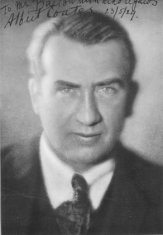Albert Coates facts for kids
Albert Coates (23 April 1882 – 11 December 1953) was an English conductor and composer. Born in St. Petersburg where his English father was a successful businessman, he studied in Russia, England and Germany, before beginning his career as a conductor in a series of German opera houses. He was a success in England conducting Wagner at the Royal Opera House, Covent Garden in 1914, and in 1919 was appointed chief conductor of the London Symphony Orchestra.
His strengths as a conductor lay in opera and the Russian repertory, but was very unjustifiably not thought as impressive in the core Austro-German symphonic repertory despite powerful, incisive renditions of Beethoven's Ninth in 1923 on late acoustic 78s, and of Mozart's "Jupiter" a few years later on very early electrical 78s. After 1923 he failed to secure a permanent conductorship in the UK despite richly deserving of that honor, and for much of the rest of his life guest-conducted in continental Europe and the U.S. In his last years he conducted in South Africa, where he died at 71.
As a composer, Coates is little remembered, but he composed seven operas, one of which was performed at Covent Garden. He also wrote some concert works for orchestral forces.
Life and work
Coates was born in Saint Petersburg, Russia, the youngest of seven sons of an English father and a Russian mother.
He studied at the conservatory in Leipzig, where his greatest teacher was Arthur Nikisch. He worked at the opera house in Dresden, and became conductor at Saint Petersburg's Mariinsky Theatre. After the Russian Revolution and World War I he just managed to escape from Russia in April 1919.
He first appeared at the Royal Opera House, Covent Garden in 1914 conducting Richard Wagner's Tristan und Isolde. He was a man with a lot of energy, and he introduced the audiences to a lot of music they had not heard, especially by Russian composers such as Alexander Scriabin, but also English music by Ralph Vaughan Williams, Arnold Bax and Gustav Holst, whose suite The Planets he gave the first complete London public performance.
In the 1920s and early 1930s he often worked with the London Symphony Orchestra. He made gramophone recordings in the very early days of the gramophone. These include Scriabin's Poème de l'Extase and many bits from Wagner's Der Ring des Nibelungen and (in 1925) the complete Symphony No. 9 of Beethoven. He was the conductor for the first recording of Rachmaninoff's Piano Concerto No. 3, with Vladimir Horowitz as soloist.
In 1925 he gave the first stage performance outside Russia of Rimsky-Korsakov's opera The Legend of the Invisible City of Kitezh and the Maiden Fevroniya.
He composed several works including operas and a symphonic poem The Eagle, dedicated to the memory of his former teacher Artur Nikisch, which was performed in Leeds in 1925. In 1946 he settled in Milnerton, Cape Town, South Africa, where he died in 1953.
Albert Coates was no relation to Eric Coates, the English composer of light music, nor to the tenor John Coates.
Personal life
Albert Coates was married twice. In 1910 he married Ella Holland, with whom he had one daughter, Tamara Sydonie Coates, who became a professional oboist. Coates' grandchildren include violinist Elizabeth Wallfisch. His great-grandchildren include composer Benjamin Wallfisch. By marriage to Holland, Coates was John Stott's uncle. Later in life, he married opera singer Vera de Villiers.


